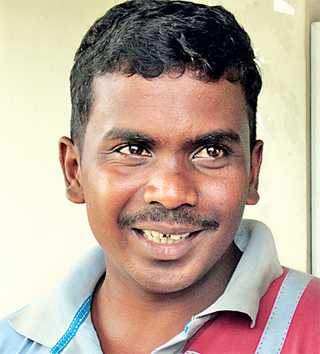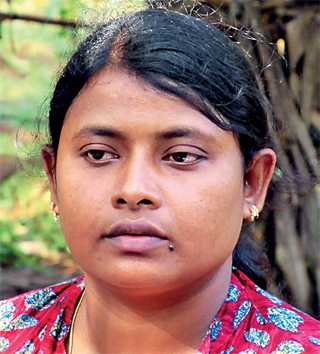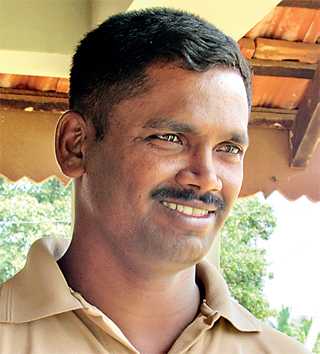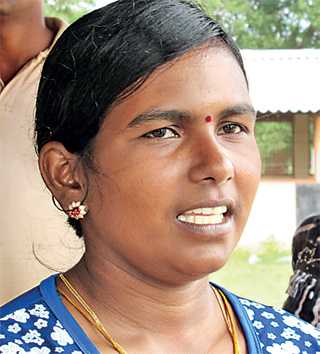Saturday Feb 21, 2026
Saturday Feb 21, 2026
Monday, 21 January 2019 00:00 - - {{hitsCtrl.values.hits}}
By Shanika Sriyananda in Kilinochchi and Mullaitivu
With a serious look in her eyes, she was trying to laugh like other women in the group, seated under the shady mango tree to cover themselves from the hot northern sun. Clad neatly in white sarees, they had celebrated Pongal in the morning before they came to the farm, where they work five days a week.
 |
Jeromson |
 |
Niluka |
 |
Rajiv Gandhi |
 |
Sirikala |
All in their mid-30s to 40s, they are afraid of losing their jobs in that 600-acre land, where they have harvested cashew nuts, vegetables and fruits for over five years.
Wijendran Geethika, 35, looked confused. Though she smiled time to time for small jokes cracked by those in the group, she was always in deep thought. All married women wore a red pottu, but there was nothing on her forehead.
“I wouldn’t know what to do if I lost my job,” she mumbled. Geethika, who has no proper educational qualification due to the war that had raged in the North for over three decades, has to feed her three young children and her old parents.
She had been clueless that she was living with a married man who gave her three children until his wife had shown up. Like many other girls in her village – Ganeshapuram – who were given in marriage in their teens, she had also started living with that man to prevent the LTTE from snatching them to strengthen its fighting force during the final stages of the war.
Geethika, who was struggling to feed her family, joined the Sri Lanka Army (SLA) to work on farms in the North, ignoring the objections of her neighbourhood.
“I am lucky as I was able to get a job at the Vellankulam farm. I built my house by getting a loan, for which I have to pay Rs. 20,000 every month. But if I lose this job, how am I going to pay my bills? I have no savings and my children will suffer,” she said with a quivering voice.
Selvaratnam Dharshini (35) and Poowanraj Nirmala (36) had worked on the formerly LTTE-run farm, which spans over 600 acres, where they mainly had the cashew nuts cultivation.
“I started working here when I was a 12-year-old. I helped to plant trees and also watered them,” said Dharshini.
She said that over 500 people worked on the farm, and they were paid Rs. 100 each. The harvest from vegetables and fruits were sold at the Mannar and Kilinochchi markets and also in small village boutiques.
“The LTTE paid Rs. 100 for us daily,” Dharshini, who had worked on the farm since 2006 for four years, said.
The decision of the Presidential Task Force (PTF) to release 1,208 acres of State and private lands in the North, mainly releasing Army farms in the North, has sent shock waves among the youth, including ex-LTTE cadres, recruited to work in those farms.
“What is the purpose of releasing the Government-owned lands? To whom are they going to hand over these farms in which we are working hard to get high yields? These farms are not running at losses and if these are taken from the SLA, we will not have jobs,” many whom the Daily FT interviewed opined.
Most of them who have no other means of earning in the North said they may have to take their lives if they are unable to pay their loans and leases, which they settle with their monthly salaries.
“When we first came for interviews, people in our villages warned us not to join the SLA. If we lose our jobs, they will laugh at us. We can’t face society as we will become debt-ridden,” they said.
Married to a former LTTE cadre, the 32-year-old Gnasekara Sirikala from Malayalapuram, Kilinochchi felt empowered with her steady monthly salary of Rs. 54,000.
Her husband, who underwent rehabilitation for nearly two years, is unable to do heavy work as he had a walking difficulty after he met with an accident and also due to shrapnel still hidden in his skull and the waist.
“I have two little children, and working at the Udayarkattu farm is easy for me as it is close to our house,” she said.
Sirikala has bought a paddy land from her savings from that salary and is also waiting to get a loan to complete her house.
She said that they had to undergo many hardships with no employment and mainly depended only on her husband’s meagre earnings, who worked as a labourer despite his walking difficulties.
Before enrolling in the Army, she had to pawn her jewellery to feed her family. Today, she is paying over Rs. 30,000 to clear her debt, including the monthly interest on the pawned jewellery.
“We suffered for years. We didn’t have money for anything. A good meal was a luxury for us before I joined the Army,” she said.
Having studied only up to grade seven, 35-year-old Rajiv Gandhi didn’t think that he would earn a decent five-figure salary when he was working for a daily wage of Rs. 500 at the co-op shop in Kilinochchi.
Rajiv grew up in Vishwamadu, a former LTTE stronghold, where both his elder brother and sister were LTTE cadres and the LTTE spared him as he was an underage boy.
“Api hariyata duk vinda udda kale saha itapasse (We suffered a lot during the war and after),” he said in broken Sinhala, which he had learned by talking to the Army soldiers at the farm.
Gandhi, a father of three children, has managed to buy a bus, from which he gets an income to pay the lease of the vehicle, and also to complete his house, which is built on a loan.
“I have to spend my salary that I get from the farm to pay the lease and the loan. Most of us got loans and leasing facilities on our job guarantee,” he said.
M. Jeromson and S. Mannivannan of Kilinochchi joined the SLA amidst strong opposition from their neighbours, who were reluctant to accept them when they decided to become SLA soldiers.
“They asked us ‘why do you want to join the Army that attacked us?’ but we didn’t reply to them as we were afraid that they would harass our families. Later, when we were doing well, they also wanted to join the Army,” the two soldiers, who are being deployed in non-military duties, said.
“We were recruited by the Army to do agricultural work and were given three months training at the Pudukuduirriyappu Army Training camp. With my monthly salary of Rs. 50,0000, I got a new motor bicycle, and I am building our house and giving money to my sister who is in university while saving some money for her dowry,” Jeromson said.
Mannivannan, whose children are small, is worried about deploying to a farm far away from the Udayarkattu farm, as the security in their villages is shaky with the removal of the Army camps.
“When the Army camps were there, people were not scared and they knew they were safe. But now, people live in fear due to robbers and thugs. Before I joined the SLA, I had a different picture of the soldiers, but now I work with them and know how good and helpful they are,” he said.
“We don’t know why they take farms from the Army or by whom. We are working hard in these farms to get good yields. We love what we do. Our families have better living conditions because we have good salaries,” Jeromson, who was dreaming of getting a government job, said.
The two soldiers are clueless about the Parliamentarian who represents them as they have never seen a politician coming to their villages.
“No politician has spoken to us yet on our jobs or future after releasing lands. Only Army officials tell us not to worry and that they will look after us anyhow,” they said.
Security Forces Kilinochchi Commander Maj. Gen. Ralph Nugera assured that the workers in the Army-run farm in Vellankulam would continue to be employed as the Army would retain 100 acres out of the 600-acre land, which is earmarked to be released today.
“Some ex-LTTEers are also given employment in these farms but if some had to deploy to other farms in the North, they had to get used to those areas,” he said.
The Government had earned Rs. 11.8 million in 2018, which is the highest recorded income, by selling over 30,917kg of cashew nuts from the Vellankulam farm.
The farm has mango trees in 48 acres, 225 coconut trees in three acres and vegetables in 15 acres. While the cashew nut harvest was sold by calling tenders, the vegetables and fruits were sold mainly in the Mallavi, Mullankavil and Kilinochchi markets.
Civilians and ex-LTTE cadres were first recruited to the Vellankulam farm in 2014 with 25 people and today, it has 32, including 22 ex-LTTE cadres working on the farm.
Over 25 workers in the Nachchikuda farm have been transferred to the Vellankulam farm as it will be released today. Out of 25 workers, 19 are ex-LTTE cadres.
The officials said that over 30 workers from Udayarkattukulam will also be transferred to Vellankulam farm soon.
Niluka Victor, who was recruited recently to handle the office work of the Vellankulam farm, had lost her left leg to an anti-personnel mine when she was fighting in Kilinochchi.
She, who says that the LTTE conscripted her when she was at her sister’s house, returned home with the amputated leg, and later underwent rehabilitation for a year at the Pampamadu Rehabilitation Centre, working as the translator while supervising the work on the farm.
“When the farm is given back, we only have 100 acres to work and we do not have any other farm to go to. Our headquarters is at Kandakadu and for many, it is far away from their villages,” Niluka, who got an artificial limb from the Jaipur Foot Centre in Jaffna, said.
These workers – youth recruited to the SLA, those who are doing non-military tasks and the ex-LTTE cadres – have just begun weaving their lives that had reduced to zero due to the war.
They have obtained loans to build houses, furniture, etc., and also purchased motorcycles on lease agreements. Today, they are helplessly looking at their uncertain future.
“The news on releasing our farms surprised us. What is the use of releasing these lands as they already belong to the Government? We are helpless as so far no politician is concerned about our plight,” Niluka, who is to inform the President about their agony at the event to release these farms, said.
When contacted, the SLA’s Director of Agriculture and Livestock Brig. Buwaneka Gunaratne said that those workers who were given on-the-job training in agriculture on Army farms would not be affected by releasing farms.
He said that some people in the North have misunderstood that the SLA-runs farms are on private lands but all the farms belonging to the Army occupy State lands.
“This is a completely wrong notion as we have all our farms on State lands. Most of the people in the North prefer that the SLA handle farms. The SLA has owned farms from its inception, and we will not have any issues by releasing these farms as the SLA has enough farms around the country,” Brig. Gunaratne explained.
According to Brig. Gunaratne, the three farms to be released are Udayarkattu, which spans 112 acres and has perennial crops like mango, cashew nuts, orange, lemon and some paddy; the Nachchikuda farm with 475 acres; and the Vellankulam farm, which has 600 acres. The latter two mainly have cashew cultivations.
He said that the workers, including the ex-LTTE cadres deployed to the three farms, were working hard and the SLA paid them decent monthly salaries.
“Releasing these farms will not affect those workers as the SLA has already made arrangements to keep them in the same agricultural process,” he noted.
“We are working here peacefully with soldiers with no differences. They treat and look after us well. If we lose our jobs at SLA farms, we are going to be isolated again as this bond between us and the SLA will be disrupted,” they said.
Meanwhile, some workers, including ex-LTTE cadres, on the condition of anonymity said that some politicians, although they preached about reconciliation, were not happy with the peaceful co-existence of the soldiers, Tamils and ex-cadres.
“We are learning Sinhala from the Army soldiers and they are learning Tamil from us. Now both of us can communicate well and understand each other well. It is now very difficult to break our bond and this has made it difficult for the politicians with different agendas to create conflicts among us. We have doubts that this is a conspiracy to achieve their agendas. This is why we want to talk to the President directly,” they said.
Attempts to contact the TNA political representatives in Kilinochchi and Mullaitivu yesterday failed as they were busy organising the event with the SLA and other government agencies.
